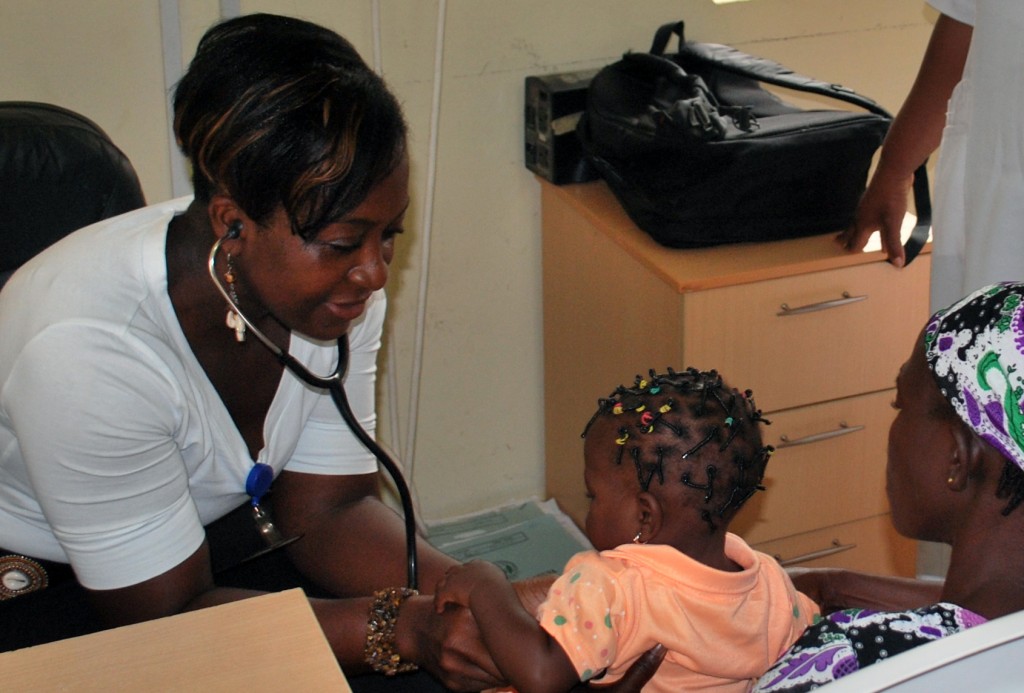1st December is World AIDS day. It is a day devoted to uniting people in the fight against HIV, showing support for people living with HIV and commemorating those who have died from AIDS. Today, we bring the story of Ghanaian lady scientist Nadia Sam-Agudu who is involved in treating children who are infected with HIV.
-

“I crafted my career choice to benefit African children!” Dr. Nadia Sam-Agudu is examining an HIV exposed baby
Most of what I remember about primary school science was from class four to six. I was fortunate to attend an elite school, but I don’t remember our science classes being that diverse or exciting. We certainly did not put together any science experiments, which I think we should do more of, in our schools. I do remember mostly learning about flowers, plants, insects etc-mostly biology. There is so much more to learn, and we really should expand our curriculum to more physics and chemistry. For example, pupils should be encouraged and guided to use their knowledge of how to set up electric circuits to build small appliances. Chemistry lessons can have practical applications such as taking students through the process of making soap-or or even demonstrating that cooking, yes, making food- is chemistry! Even if a child will not choose a science career, early exposure to science fosters and feeds curiosity, and will promote lifelong learning.
![]()
We hope reading the story about how Nadia made it into her career inspires you to consider what you can also do about HIV. Find ideas and information here in our ScientiFACTs about HIV & AIDS
![]()
As a child I occasionally fancied being an airline pilot, but deep down, I had always wanted to be a doctor. That never changed! In secondary school I was so fascinated by science, especially biology, so I studied straight from the textbook and wrote my own notes. I didn’t depend only on what was taught in class because in such a situation a poorly-trained teacher could hamper my success – I wouldn’t allow that. Also I had some very good teachers who I made sure to learn maximally from. The science textbooks were very good, and I was fortunate that my parents could afford to buy them for me.
It is usually not a problem in secondary school to be allowed to study a course of one’s choice, however difficulties come up in University where some students may not get their preferred course because there are not enough spaces, or the standard for entry may be too high. I went to a University in the US, where getting your course is not usually a problem even if you are an average student. The first degree was however not adequate for finding work in Ghana, at least the kind of work I was looking for. I wanted to be a doctor, and that required a graduate program. I went on to medical school, where I was greatly transformed while learning about how science could heal sickness. I focused on learning about infections affecting children.
I crafted my career choice so that I could be maximally beneficial to African children. I remember one little girl I took care of, when I was working in Uganda. I was working as a malaria scientist, trying to find the best ways to treat the worst cases of malaria. I will call the little girl Precious – she was about three years old, and she had very intense malaria, to the point that it affected her brain. This kind of malaria is called “cerebral malaria.” Precious was brought to the hospital in a coma, meaning she could not speak or respond to anything. It was as if she were dead. Myself and other doctors gave Precious a drip with glucose (sugar) in it, plus a new malaria medicine that worked very fast, through the drip. Within a few hours, Precious was awake. By the next day, she was eating. In three days, she went home, looking very lively! I cannot imagine doing anything else. Healthy children make smart children who can become productive adults for a stable and progressive country.
To others, especially girls who wish to take after me, I’d say don’t compromise on your choice of career. Stick to what you want to do, what you think will make you happy and satisfied. If you want to do science, don’t allow anyone to tell you it is not appropriate. If you don’t get your choice, as much as you can afford it, go to another school or another country to do it. A good thing also is to find a practicing professional whose career path and current work you can learn about and follow, and also support from adults around you in achieving your goals.
Dr. Nadia Sam-Agudu works at the Institute of Human Virology, Nigeria and is also associated with the Institute of Human Virology at the University of Maryland in Baltimore, USA as a technical advisor in pediatric HIV.